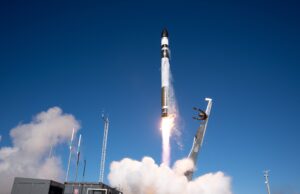National Space Council Reborn To Fulfil UK Space Ambitions
23rd Jul 2023
The UK’s National Space Council has been reinstated. Their first meeting, held on 19th July, saw government ministers discuss “the UK’s mission to become a true space superpower.” The Council said the UK has already achieved extraordinary growth, with 2021 figures showing the industry employed a 49,000 strong workforce and generated £17.5 billion in income – £1 billion in growth compared to 2020.
However, sights are set on the industry’s future in the global space market under the Council’s leadership. Secretary of State for Science and Technology Chloe Smith said in a press release: “Our reinstated National Space Council will ensure the government moves in lockstep with the sector to deliver our ambitions to grow the space economy. The UK is perfectly placed… to be not only a European leader but a global power in space.”
The First National Space Council Meeting
Dissolved by the Truss Government last year, the National Space Council was re-launched after Minister of State in the Department for Science, Innovation and Technology George Freeman came under fire for the Council’s delayed resurrection. Now, the Council will coordinate government policy on space, and, under Prime Minister Rishi Sunak’s five key priorities, will promote the industry’s role in job creation and economic growth.
The Council’s first meeting was co-chaired by the Science and Defence secretaries, who were joined by other cabinet ministers, as well as industry experts including astronaut Tim Peake, who provided insights into the industry. Lunar rocks taken from the Apollo mission also made an appearance, which served: “as a fitting metaphor for the UK’s ambitions to aim for the Moon and beyond.”
What Was Discussed
During the meeting, ministers discussed the UK’s ambition to become Europe’s leader in small commercial launches by 2030. The ‘Case for Space’ report was also discussed, which outlines new research that captures the industry’s value to the UK economy.
Additionally, the report explores what the UK has already accomplished. This includes previous investments of over £80 million in space weather forecasting, leveraged position, navigation, and timing for the emergency services, and utilised Earth Observation capabilities to aid the farming and food industry.
‘National Space Strategy in Action’ Plan
The meeting coincided with the publishing of the National Space Strategy in Action plan, authored by DSIT and the Ministry of Defence. Labelled a “significant milestone’, the plan sets out a ‘bold’ outline for long-term investments, and the direction the UK will take to support the growing commercial space sector. Informed by the plan, the UK aims to:
- Develop a space sector plan to increase economic growth and resilience;
- Establish space clusters in the UK space ecosystem;
- Create a space workforce action plan;
- Review regulations for space effectiveness and innovation;
- Understand the long-term approach to civil capabilities and defence; and
- Review progress on the Defence Space Strategy
Dr Paul Bate, Chief Executive of the UK Space Agency, said: “The National Space Strategy in Action [plan] highlights the significant progress made towards delivering the government’s ambition to make the UK one of the most innovative and attractive space economies in the world.”







Thank you for your comment! It will be visible on the site after moderation.